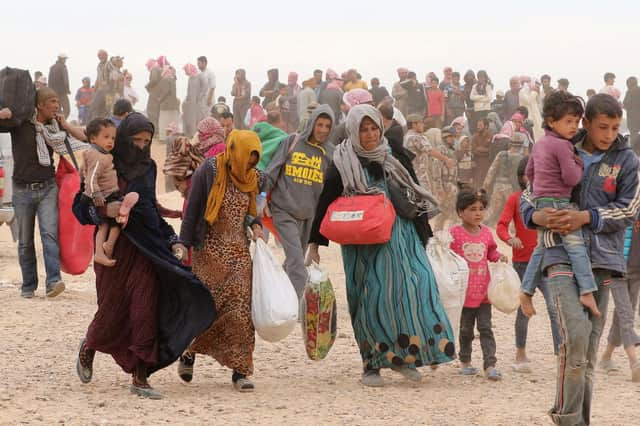Migrant crisis cries out for solution - Roddy Gow


The challenge is how and where to deal with this. Many can remember the Vietnam Boat People and much more recently those escaping from war and economic privation in the Middle East and sub-Saharan Africa. Indeed, the weaponising of migrants trapped on the Belarussian-Polish border poses a real threat. It is time to consider the reasons behind the forces that drive individuals and families to take such risks to escape from the countries where they were living and seek a better solution.
What is the extent of the crisis?
At least 82.4 million people around the world have been forced to flee their homes. Among them are nearly 26.4m refugees, around half of whom are under 18. There are also millions of stateless people, denied a nationality and lack access to basic rights such as education, health care, employment and freedom of movement.
Advertisement
Hide AdAdvertisement
Hide AdAccording to UNHCR this is a time when one in every 95 people on earth has fled their home as a result of conflict or persecution. From Syria alone there are 6.8m refugees and asylum-seekers, while Turkey hosts nearly 3.7m, the largest number of refugees hosted by any country. Syrian refugees are also in Lebanon, Jordan and Iraq. Returnees face a daunting situation including lack of infrastructure and danger from explosive devices.
Where is the refugee crisis the worst?
More than 24m people are in need. Yemen is facing the worst humanitarian crisis in the world today. Even so, the country still hosts more than 200,000 refugees from neighbouring Somalia and Ethiopia.
Figures produced by the International Rescue Committee (IRC), headed by David Milliband, report that more people have been forcibly displaced from their homes than at any time since the Second World War. The IRC responds to some of the world's worst crises, delivering aid that saves lives while paving the way for long-term recovery.
What drives people to migrate?
The recent COP26 conference in Glasgow explored the climate changes that have driven refugees to migrate from their home country as a result of dramatic floods, desertification and drought making their means of livelihood untenable. Conflict, disease, and population levels are also factors in forcing people to consider migrating in search of a better life. Better shared information has made us much more aware of this problem in the West.
What are the causes of the global refugee crisis?
There are various types of persecution which lead to a refugee crisis; war, climate Change, violations of human rights, financial hardships, hunger, gender and sexual orientation.
What are the solutions?
Anything that improves the environment from which refugees are forced to move is widely seen as the best way of mitigating this challenge. Aid directed towards local markets is known to be beneficial helping rebuild faile d or faltering economies. Where migrants are forced to make perilous sea crossings by boat, as in the English Channel, a proper clearing system in Western Europe that separates genuine refugees from others could surely create groups of certified migrants who could be transported on normal, safe ferries. Centres with adequate accommodation would provide an environment where migrants could be processed and once cleared, be helped on their onward journeys.
The time for effective action is now. Under UN or other coordinated planning, regional solutions need to be found. The agony and suffering of these migrants is a ticking time bomb that will explode in conflict before too long. Scotland should help by deploying professionals to help meet this challenge.
Roddy Gow, Chairman and Founder, The Asia Scotland Institute
Comments
Want to join the conversation? Please or to comment on this article.